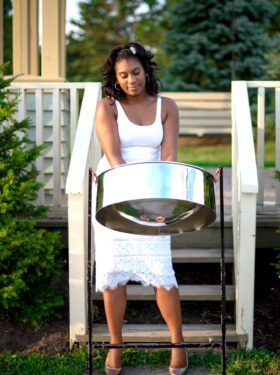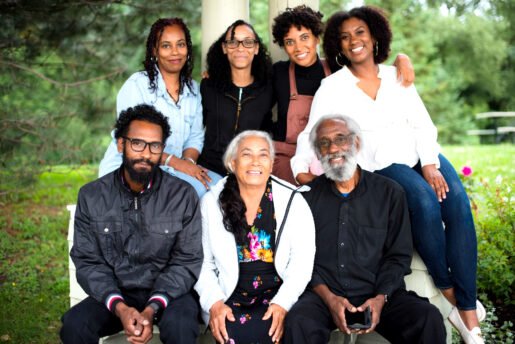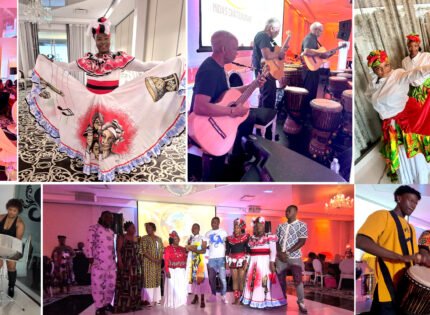 The Steelpan was a permanent fixture in the Salah household. Growing up the youngest of four siblings, Fatima Wilson watched her father,
The Steelpan was a permanent fixture in the Salah household. Growing up the youngest of four siblings, Fatima Wilson watched her father, teach all her siblings the steelpan in their basement and almost naturally she picked up the span ticks and started playing. That was over 30 years ago and today she’s not just playing but teaching the steelpan.
teach all her siblings the steelpan in their basement and almost naturally she picked up the span ticks and started playing. That was over 30 years ago and today she’s not just playing but teaching the steelpan.
She tells the CONTACT that her father, steelpan savant Salah Wilson, tells the story of her learning the steelpan best, “My father and mother came from Trinidad to Canada, and they came with their steelpans. My father would teach the pan in our basement, he told me that when he would be teaching my siblings, I would come downstairs and look at what they were doing. Afterwards I would mimic what they were doing without even being taught. He said I was a fast learner I would play whatever they were doing on the tenor, alto and even soprano pan.”
Steel pans, also known as steel drums, originated in Trinidad during the 1930s, but their roots can be traced back to African slaves who brought elements of their culture, including hand drumming, to the Caribbean in the 1700s. These drums became integral to Trinidadian carnival celebrations. In 1877, the British government banned drumming during Carnival, leading to the emergence of bamboo stamping tubes as substitutes. These were played in ensembles known as tamboo bamboo bands, which also incorporated non-traditional instruments like scrap metal and containers. By the 1930s, metal instruments took precedence in these bands, eventually evolving into the steel pan family. Early steel pans were crafted from various metal containers and kitchen utensils, with players discovering different sounds based on the raised areas of the metal. Through experimentation and innovation, the steel pan emerged as a distinct musical instrument.
Fatima says though all her siblings still play the pan, she is the one who probably plays it on a daily basis. She is a highly sought after steelpan performer but the way she sees it, she comes alive when teaching. She is an instructor at several EMSB schools, tutoring dozens of students in the fine art of playing steelpan, and in music theory at institutions including Marymount Academy and Coronation Elementary School.
Over the years she has left her mark as one of the few female steelpan players in Montreal, she credits her success to her father. She says through watching him she has been able to see the power of music and it’s ability to unite and heal. This influenced her decision to also teach at the John Grant High School in Cote Saint Luc which caters to students with special needs.
“My father had been teaching there years prior and for me from the moment I started teaching at that school, I felt a great sense of reward and was like okay this it why I am doing this,” she explains.
this,” she explains.
“I do it more for me than even for them. I feel so much appreciation when I see them learn the songs and get happy with their progress. I have learned so much from them. Teaching at John Grant was a turning point for me and that’s why I have continued.”
Some of the students she has, have been under her tutorship since grade one and they are now eleventh graders. She has a lot of hope in them and she sees the determination they have when it comes to playing the pan. It encourages her that there will be a next generation of pan players. She sees music as a way of not just preserving culture but learning about the culture. While the instrument originated from Trinidad it can be played by all.
“Today I was with one of my students after a performance and she heard Bob Marley on the radio and she was animated,” she explains, “She was saying Miss! Miss! I can hear the notes and that made me happy. To know that their ears are trained and they can now break down a piece of music down to the notes.”
In addition to her role as an instructor, Fatima is a fervent advocate for the recognition of steelpan as a legitimate art form within Quebec’s cultural framework. She believes that integrating steelpan into mainstream curricula will not only preserve its rich heritage but also foster greater inclusivity and appreciation for cultural diversity.
“In Montreal unfortunately they don’t take music as serious as they do and as they should because it’s good for your health, even your mental well-being. Music helps even with Alzheimer’s and so much more but they don’t see it that way. This has also been my father’s push and I am going to do my best to push even harder.”
Looking forward she hopes
to see music embraced into the school system and that the sounds of pan will continue to weave across Montreal and into the rest of Canada. She is currently a student of music at Concordia University as she looks to further hone her craft in music.
















